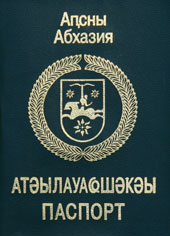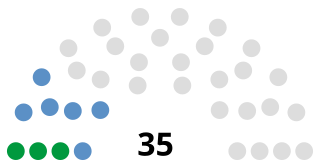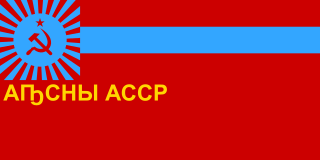
Raul Jumkovich Khajimba is the current President of Abkhazia, having been elected in 2014 after the May Revolution. He was also Chairman of the Forum for the National Unity of Abkhazia from 2010–2015. Khajimba previously held the offices of Vice President (2005–2009), Prime Minister (2003–2004) and Defence Minister (2002–2003). He unsuccessfully ran for President in 2004, 2009 and 2011.

Gennadi Leonidipa Gagulia was an Abkhazian politician who was three-time Prime Minister of Abkhazia and the head of the Chamber of Commerce and Industry. He served as the first prime minister of Abkhazia after the post was established by the constitution in 1995, holding it until 1997. He returned to the post in 2002 and remained for several months into 2003, and held it for a final time in 2018, before dying in a car crash.
Anri Mikhail-ipa Jergenia has been one of the leading politicians of the internationally unrecognised Republic of Abkhazia since it achieved de facto independence from Georgia. From June 2001 to November 2002 he was the republic's Prime Minister and for a time Jergenia looked to be the favourite to succeed Abkhazia's first president Vladislav Ardzinba.

Sergei Uasyl-ipa Bagapsh was the second President of the Republic of Abkhazia. He was Prime Minister from 1997 to 1999 and was later elected as President in 2005. He was re-elected in the 2009 presidential election. He died on 29 May 2011, at the age of 62, from complications of surgery.
Sergei Shamba is a senior politician from Abkhazia. He is currently a member of the People's Assembly of Abkhazia and Chairman of United Abkhazia. He was Prime Minister of Abkhazia under President Sergei Bagapsh from 13 February 2010 until 27 September 2011. Between 1997 and 2010 he had been Minister for Foreign Affairs under both Bagapsh and his predecessor Vladislav Ardzinba, with only a half-year interruption in 2004. Shamba has twice unsuccessfully participated in Presidential elections, in 2004 and 2011. He has been a staunch proponent for dialogue between Abkhazia and Georgia.
Politics in Abkhazia is dominated by its conflict with Georgia. Abkhazia became de facto independent from Georgia after the 1992–1993 war, but its de jure independence has only been recognised by a few other countries. Abkhazia is a presidential representative democratic republic with a multi-party system, wherein the President is both head of state and head of government. Executive power is exercised by the government of the Republic of Abkhazia. Legislative power is vested in both the government and the People's Assembly of Abkhazia.

Aleksandr Ankvab is an Abkhaz politician and businessman who was President of Abkhazia from May 29, 2011, until his resignation on June 1, 2014. Under President Sergei Bagapsh, he previously served as Prime Minister from 2005 to 2010 and Vice-President from 2010 to 2011.

Gulripshi District is a district of Abkhazia, one of Georgia’s breakaway republics. It corresponds to the eponymous Georgian district. Its capital is Gulripshi, the town by the same name. Until the August 2008 Battle of the Kodori Valley, the north-eastern part of Gulripshi district was part of Upper Abkhazia, the corner of Abkhazia controlled by Georgia until the Battle of the Kodori Valley during the August 2008 South Ossetia War. Upper Abkhazia was home to 1,956 of the district's 19,918 inhabitants, most of whom were ethnic Svans. Most of these fled before the battle and have not yet returned.
On 3 October 2004 Abkhazia held its second Presidential elections since the post of President of the Republic of Abkhazia was created in 1994, and the first that were competitive. Election law prohibited incumbent President Vladislav Ardzinba from running for a third term and he instead backed Prime Minister Raul Khadjimba, who also enjoyed support by Russian authorities. Khadjimba's main opponent was Sergei Bagapsh, the candidate supported by the two major opposition parties United Abkhazia and Amtsakhara, and later also by Aitaira when their candidate Alexander Ankvab was barred from running in a controversial decision by the Central Election Commission.

The Abkhazian passport is issued to citizens of the Republic of Abkhazia for the purpose of international travel and for the purpose of legal identification within Abkhazia. As Abkhazia is only recognised by Russia, Venezuela, Nicaragua and Nauru, for all other destinations Abkhazian citizens must use another passport for international travel.

On 12 December 2009, Abkhazia held its fourth Presidential election since the post of President of the Autonomous Republic of Abkhazia was created in 1994. The election was won by incumbent president Sergei Bagapsh in the first round with 61% of the votes, thus gaining a second term in office. He was inaugurated on 12 February 2010. Bagapsh competed against four opposition candidates: former Vice President and Prime Minister Raul Khajimba, who came second behind Bagapsh in the 2004 Presidential election, and newcomers Beslan Butba, Zaur Ardzinba and Vitali Bganba. Khajimba had stated that he, Ardzinba and Butba would support each other should one of them reach the second round of the election.

The Government of President Vladislav Ardzinba was the first Government of the Republic of Abkhazia.

A presidential election was held in the Republic of Abkhazia on 26 August 2011. This was the fifth such election since the post of President of the Republic of Abkhazia was created in 1994. The election was held to elect the successor of president Sergei Bagapsh who died in office on 29 May 2011.
On 14 March 2008, Abkhazia held local elections for the 1st convocations of its local assemblies in Sukhumi and all districts but Gali.
The State Security Service of Abkhazia is the principal security and intelligence agency of Abkhazia.
Tamaz Gogia is the current Chairman of the Central Election Commission of Abkhazia.













